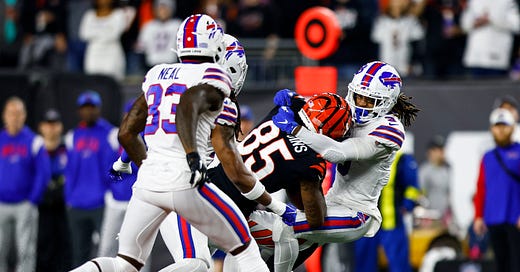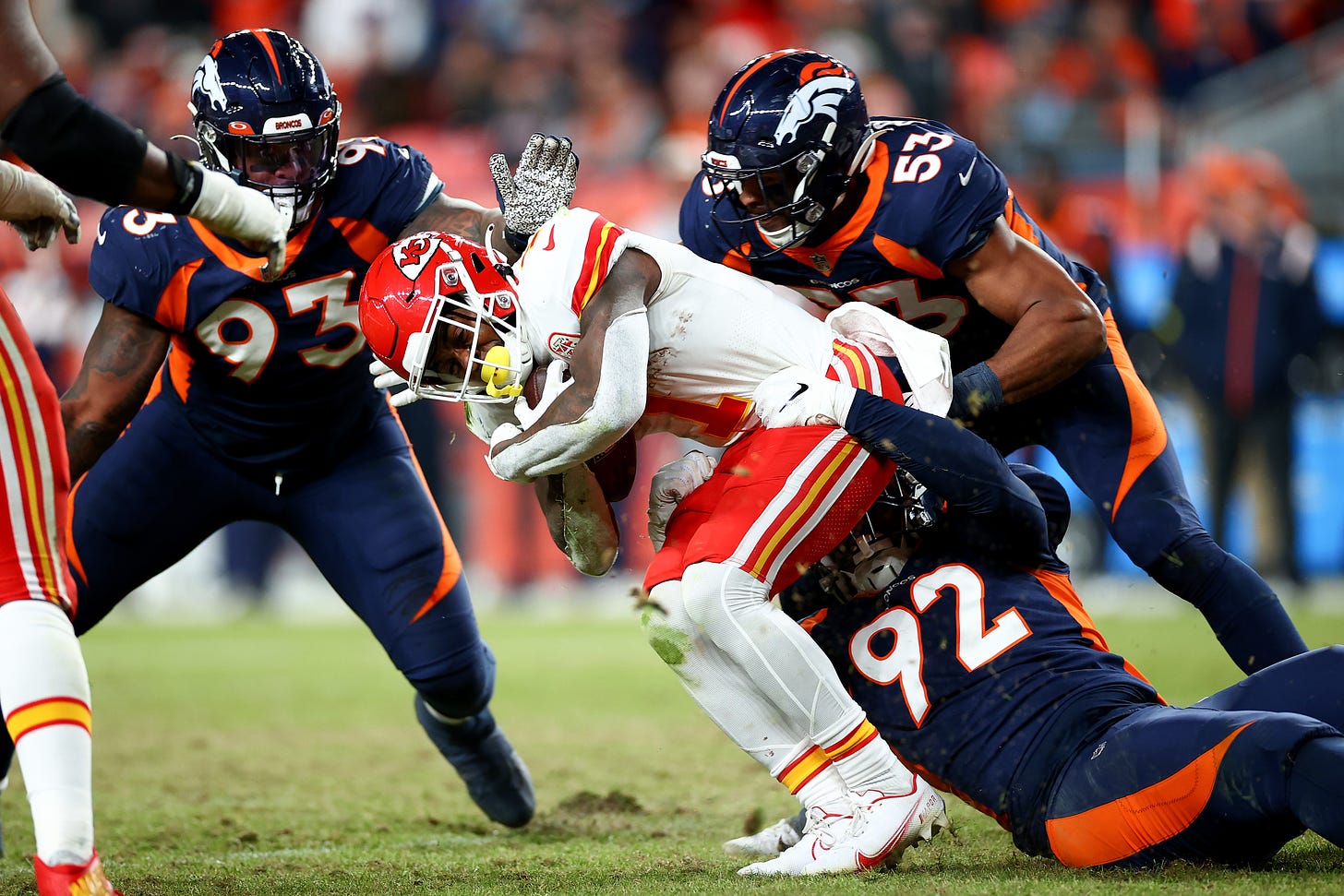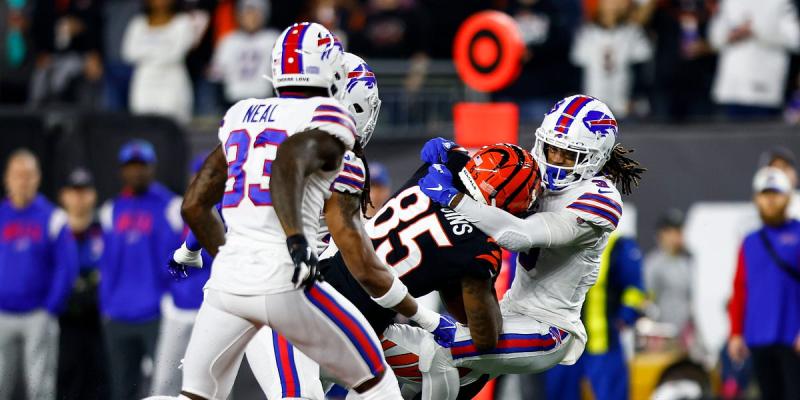Why America Needs Football. Even Its Brutality.
By: Ethan Strauss

Why America Needs Football. Even Its Brutality.
We can pine for a new kind of human being who doesn't crave violence. Or we can be happy we have the NFL.

Damar Hamlin of the Buffalo Bills takes a near-fatal hit on January 2. (Photo by Kevin Sabitus via Getty Images)
I knew this guy in college—soft spoken, smart, kind. He joined the military, and there wasn't much his Berkeley Hills parents could do about it. And they tried. Desperately.
His choice to enlist wasn't about 9/11 or Iraq. He didn't have any fantasies about saving innocent lives or raising the American flag atop Iwo Jima. He didn't think much about whether the uniform would get girls, or what exciting, exotic places he'd see.
It was something else.
War was just in him. He loved reading about it, loved learning about the weapons and battles. He needed to do this—to kill and risk being killed. And no, he wasn't a school shooter or an incel; no rage burned within him.
The idea of this person would be mystifying to many of my peers—those of us who grew up in "Free to Be. . . You and Me," post-draft America. But if you met him, it made sense. There are many such men.
I am not one of them, and perhaps I'm in the majority. The ranks of the un-war-like might even be growing, thanks to the modern, sedentary lifestyle eroding our primordial selves.
But the war-wanters remain, holdovers from a time when we needed them to want it, which is to say almost all of human history.
Of course, it's good that there is less war today. (There is some debate about whether the world is, in fact, becoming less violent, but there's no disputing that the number of war-related deaths has plummeted since World War II.) Modern life might be unfulfilling, but the fact remains you're unlikely to die on a beach separated from your entrails.
Still, the old imperatives remain. We have war within us, whether or not there's one to wage.
And the NFL gives Americans that war, as spectacle, week after week.
Today, at 6:30 p.m. Eastern time, begins the biggest spectacle of them all: the Super Bowl, where we channel those ancient animal spirits into a highly commercialized event that ends with fireworks and a shiny trophy.
We should celebrate that.
By now, you've probably heard all the arguments lodged against the most popular sport in America. There were plenty of them in the aftermath of Buffalo Bills safety Damar Hamlin nearly losing his life after getting body-slammed during a January 2 game with the Cincinnati Bengals. The New York Times, reacting to Hamlin's on-field cardiac arrest, declared: "We're All Complicit in the N.F.L.'s Violent Spectacle." Ryan Clark, the NFL player-turned-ESPN commentator, informed us: "Tonight we got to see a side of football that is extremely ugly, a side of football that no one ever wants to see, and never wants to admit exists."
Today's anti-football arguments are more racially freighted than those of the pre-Colin Kaepernick past. After Hamlin's near-death experience, Scientific American fretted: "The 'terrifyingly ordinary' nature of football's violence disproportionately affects Black men."
The violence does affect athletes in a "terrifyingly ordinary" way. There have been NFL players, even great ones, who killed themselves. Brain injury, or chronic traumatic encephalopathy (CTE), appears to be an unavoidable risk for players who engage in frequent collisions, especially linebackers. Boston University just released a study showing that 92 percent of NFL players suffer from CTE.
About a decade ago, writers at high-end publications started calling for an end to football. Malcolm Gladwell dubbed it "a moral abomination" and predicted its imminent obsolescence. "This is a sport that is living in the past," Gladwell said in 2014, "that has no connection to the realities to the game right now and no connection to American society."
Gladwell was wrong. In 2022, 82 of the top 100 TV shows in America were NFL games, and the top 50 most viewed sporting events were football games or events that immediately followed football games. By contrast, in 2016, only 33 of the top 50 were football-related. The country has lost interest in so much else, but football remains a huge draw and, in fact, is gaining relative market share.
What did Gladwell miss?
He couldn't see that football violence is an eternal violence. It only seems as if it's a relic of a less civilized time, because it's been with us for so long. This inability to see things clearly, I suspect, is more prevalent among the likes of Gladwell, me, and other members of the mainstream media.
The participants themselves, the ones punished by the game, are not so dismissive.

Like soldiers on the battlefield, football players have to watch their buddies’ backs, lest an enemy break it. (Corey Perrine via Getty Images)
One theme of sportswriter Tyler Dunne's The Blood and Guts: How Tight Ends Save Football , is that these men accept their fate, painful though it may be. On my podcast, Dunne told me, "I haven't talked to one football player who has said, 'I would not do it again,' when they're in pain."
Such players do exist, but they're unusual. A 2013 Washington Post survey found that, of the nearly 90 percent of retired NFL players who experience daily pain, 91 percent of them attribute it to football—while 93 percent of all retired NFL players report that they are happy they played. In other words, the vast majority of ex-players who suffer from their playing do not regret their football years. The draw of the gridiron is so powerful that its participants consider it a bargain. It is worth experiencing lifelong pain in return for the privilege of playing the sport—however briefly.
Gladwell once asked: "How different are dogfighting and football?" The implication was that the young men of the NFL, hailing from the inner city, were funneled into this game like so many mistreated pit bulls. But if those same men tell us, years after retiring, that they're happy with the choice they made—well, to consider them victims is to deprive them of their agency.
It should be pointed out that this lends the NFL a great deal of authenticity. By contrast, the NBA, the league I covered for years, is viewed by many as overrun with players uncommitted to their fans, teams and fellow players. This is due to so-called player empowerment, with superstars like Kyrie Irving jumping from one team to another in quick succession, and "load management," which gives players frequent rests, allowing them to skip games. (This may explain why, in 2017, an average of 20.4 million viewers tuned into the Finals, and in 2022 that figure was 12.4 million—despite a near perfect matchup of Steph Curry's Warriors against the Boston Celtics.)
Not the NFL. The players' willingness to get hurt tells viewers they're for real. Maybe the players are motivated by money, maybe it's all a pretext to sell beer. Maybe, maybe, maybe —but when you're out there, between the lines, on that sacred ground, you really could get hurt. People respect that. When Hamlin woke up, the first question he asked was: "Did we win?"
Central to Hamlin's unbreakable bond with the game, like that of countless other players, is the feeling of brotherhood one experiences on the field—which mimics the same feeling, presumably, one encounters in the foxhole. In basketball, your teammates depend on you, but they don't depend on you to keep them safe. In football, your mistake can hurt your teammate. You're not just responsible for yourself. You have a duty to watch your buddy's back, lest an enemy break it.
In Any Given Sunday , Oliver Stone's meditation about football's hold on the American mind, the coach, played by Al Pacino, waxes poetic about what retired quarterbacks miss most about playing football. It wasn't the girls or the glory.
"You know what he missed?" the coach tells us. "What he missed were those other guys looking back at him in the huddle. Those 11 guys, every one of them, seeing things the same way."
A commonly heard refrain from athletes.

The Kansas City Chiefs have fought their way to a place in this year’s Super Bowl. (Jamie Schwaberow via Getty Images)
Modernity has given us much, including the alienation and isolation of the daily, digitalized, compartmentalized grind. We feel, more than ever, cut off from other human beings. If I don't depend on you for survival, then how badly do I need you? And how much do you need me?
We can pine for a new kind of human being who doesn't crave that ancient, animal spirit. Or we can be happy we have football, its many pitfalls notwithstanding. We can feel reassured that the violence on the field is orderly and, in so far as this is possible, civilized.
Football is that special place where, for three hours or so, we get to peer deeply into the way things used to be—sort of. Of course, we should be overjoyed that most countries no longer fight world wars or wars of religion or massive, bloody civil wars. Nobody sane wants that death. But everyone wants the stakes, the drama, and the bonds that come with that.
This evening, when the Eagles and the Chiefs do battle with each other at State Farm Field, outside Phoenix, people will tune in to watch because—as commercialized and ephemeral as its glories may be—football returns us to the sense of the sacred.
The administrator of this group reserves the right, along with the site moderators, to moderate all and any postings to this group, including the right to enforce the ToS, the CoC, and also including anything that the administrator deems within his sole discretion to be offensive, including and not limited to off topic or 'no value' comments, with the power to delete in exercising those rights.
It would be best, therefore, to be civil in posting on this group.
By now it should be well known that I am unable to open certain sources, videos and pictures. If I cannot, I will ask that they be described and explained. If the poster refuses to comply, their comment will be deleted. Instagrams are banned.

 Article is LOCKED by moderator [Buzz of the Orient]
Article is LOCKED by moderator [Buzz of the Orient]




Football never interested me, even though I was on my high school football team. I consider basketball boring, even though it was invented in Canada. Growing up in Canada, hockey was THE sport, and before there was TV I would listen to Foster Hewitt announcing the games, hearing him shout the famous words "He shoots, he scores". But then the Blue Jays came to town, and because of my involvement in Variety Club I got seasons tickets for four seats 10 rows up behind the catcher in the Skydome which I shared with my brother and two friends. It was a great time when we would sit around our breakfast table and go around the table choosing the games we wanted and then sharing pairs for some of them - we all always got all the games we wanted. The most exciting moment in sports I ever had in my life was being there, in the Skydome, to watch Joe Carter hit the home run that won the Blue Jays its back-to-back second World Series.
But I digress. Having already posted some articles about American politics, a few about guns, I'm now completing the "Big Three" - with an article about American football. There are reasons why Americans love football as much as they do. It has become by far America's favourite sport, and I think the author here has hit on at least one reason why.
Has anyone seen the movie "Concussion"?
A popular quite about football came to mind
Football is like chess, only without the dice. -- Lukas Podolski
Psychology Today offers a little insight into the U.S. fascination with the pigskin
Why Americans Love Football | Psychology Today
Clearly, things have changed. According to a Gallup poll, 37% of Americans list football as their favorite spectator sport. Fifty-seven percent consider themselves “fans.” That support is strongest among men, those over 35, and political conservatives. This contrasts with the 11% who claim basketball as their favorite, the 9% who favor baseball, and the 7% who prefer soccer.
Like many societies, we Americans have a taste for spectacle. But we like those spectacles to be focused, explosive, predictable, and technologically abetted. By such criteria, football wins the game
As for me
I enjoy the game (high school in my home town) college and NFL but seldom rearrange a day to watch a game rather than doing something else.
I no longer have cable tv so I watch a lot fewer games, but still follow results and standings on line
"Football is like chess, only without the dice" ??? That's a pretty weird statement, but then it was about European football, i.e. soccer. I read the Psychology Today article before I chose to post the one I did, but I thought it was too long. I may have played football in high school, but I did not enjoy it. However, I have to admit that I never excelled in sports except for rifle marksmanship wherein I was the school champion.
I think the application is same to American football with the need to think ahead in playing both games, in outhinking your opponent on the battlefield (the chess board or the football field) and the requirement to use all t he pieces (not just the strong in chess or the flamboyant in football) in order to win the game.
A great receiver in the NFL noted
Chess is a lot of fun for me. Football is a physical game, and in chess you can just beat someone mentally - you outwit somebody, outmaneuver them, think ahead of them. Larry Fitzgerald
And from Bing AI search
American football and chess share similarities in competition, critical decision-making, psychological warfare, and the need to think multiple steps ahead 1 2 . Both games involve adrenaline rushes, victory highs, and defeat lows 1 .
I was thinking about the significance of mentioning dice, but I suppose it means there shouldn't be any gambling in chess or football. I used to play chess as well, and usually beat my opponents except for my brother, who is Mensa, and I'm not. However, I will always regret something I did many years ago. My best friend challenged me to a game of chess, and while his two sons were watching I beat him. He demanded a second game in order to get even, and I beat him again. I regret that I did not throw that second game in front of his sons, who would not have realized it, because I regret that I humiliated him in front of his two sons and it is one of the things I've done in my life that I wish I could change if I ever had the chance.
I love to play chess, though as I get older I play less and less
My son learned to play chess and was in a chess club of children his age and usually played very well. He always wanted to play with my friends and me. When he began to play with us, several of my fiends would occasionally allow him to triumph, but I never did.
He now has children of his own that he plays chess and many other games with and recently told me hat he knew my pals were letting him win and that he was glad I never did. I asked why. He said because when he finally did beat me it meant so much more to him.
We need to teach our children not only how to win, but also how to lose gracefully and with honor.
The only game I play now is solitaire on the computer. I no longer have anyone to play games with and although when I was a kid my mother taught me how to play mah jhongg, which is a game my wife plays (naturally) and I've totally forgotten how, she can't play the game I loved for years which I was able to play until there was nobody else around who spoke English well enough - scrabble. Only when my wife's daughter very occasionally visits (she has a job in logistics in Germany) and she speaks not only her mother tongue but is fluent in German and English as well, I get to play. At least solitaire is available for me to exercise my mind.
I was an avid football fan until 2016 when if people taking a knee during the national anthem was more important than the game.
Never looked back and really enjoy the extra time I have not yelling at the TV.
I know exactly how you felt - I agree with you about that. IMO I agree with Ecclesiastes - "To everything there is a season, and a time for every purpose under heaven:" and that wasn't it.